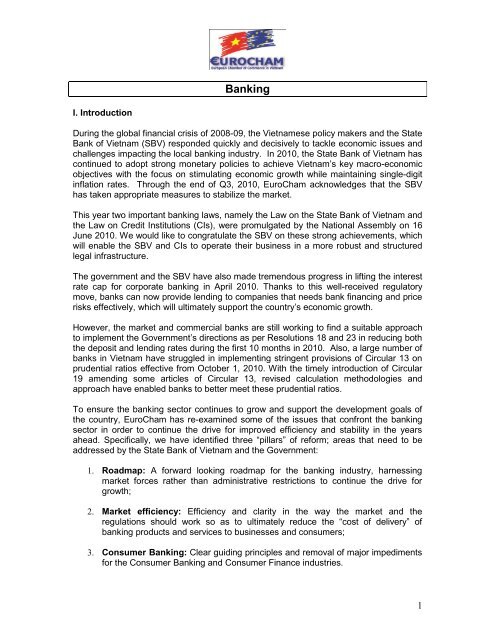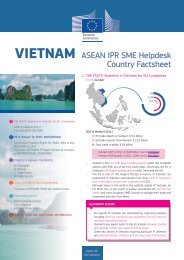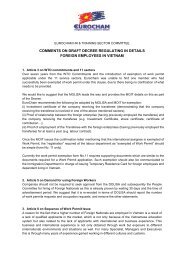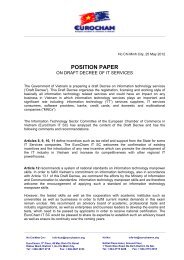Banking Position Paper 2010
Banking Position Paper 2010
Banking Position Paper 2010
You also want an ePaper? Increase the reach of your titles
YUMPU automatically turns print PDFs into web optimized ePapers that Google loves.
<strong>Banking</strong>I. IntroductionDuring the global financial crisis of 2008-09, the Vietnamese policy makers and the StateBank of Vietnam (SBV) responded quickly and decisively to tackle economic issues andchallenges impacting the local banking industry. In <strong>2010</strong>, the State Bank of Vietnam hascontinued to adopt strong monetary policies to achieve Vietnam’s key macro-economicobjectives with the focus on stimulating economic growth while maintaining single-digitinflation rates. Through the end of Q3, <strong>2010</strong>, EuroCham acknowledges that the SBVhas taken appropriate measures to stabilize the market.This year two important banking laws, namely the Law on the State Bank of Vietnam andthe Law on Credit Institutions (CIs), were promulgated by the National Assembly on 16June <strong>2010</strong>. We would like to congratulate the SBV on these strong achievements, whichwill enable the SBV and CIs to operate their business in a more robust and structuredlegal infrastructure.The government and the SBV have also made tremendous progress in lifting the interestrate cap for corporate banking in April <strong>2010</strong>. Thanks to this well-received regulatorymove, banks can now provide lending to companies that needs bank financing and pricerisks effectively, which will ultimately support the country’s economic growth.However, the market and commercial banks are still working to find a suitable approachto implement the Government’s directions as per Resolutions 18 and 23 in reducing boththe deposit and lending rates during the first 10 months in <strong>2010</strong>. Also, a large number ofbanks in Vietnam have struggled in implementing stringent provisions of Circular 13 onprudential ratios effective from October 1, <strong>2010</strong>. With the timely introduction of Circular19 amending some articles of Circular 13, revised calculation methodologies andapproach have enabled banks to better meet these prudential ratios.To ensure the banking sector continues to grow and support the development goals ofthe country, EuroCham has re-examined some of the issues that confront the bankingsector in order to continue the drive for improved efficiency and stability in the yearsahead. Specifically, we have identified three “pillars” of reform; areas that need to beaddressed by the State Bank of Vietnam and the Government:1. Roadmap: A forward looking roadmap for the banking industry, harnessingmarket forces rather than administrative restrictions to continue the drive forgrowth;2. Market efficiency: Efficiency and clarity in the way the market and theregulations should work so as to ultimately reduce the “cost of delivery” ofbanking products and services to businesses and consumers;3. Consumer <strong>Banking</strong>: Clear guiding principles and removal of major impedimentsfor the Consumer <strong>Banking</strong> and Consumer Finance industries.1
II. Roadmap (Pillar 1)1. Law on Credit Institutions / Scope of activities of foreign bank branches (FBB)and 100% foreign owned banks (WFOB)A specific, unambiguous and comprehensive law governing credit institutions is crucialto successfully attract investment and promote growth in financial services. A major stepforward in this area has been made with the Law on Credit Institutions having beenpassed by the National Assembly on 16 June <strong>2010</strong>. This new Law will take effects from01 January 2011 and we understand that the SBV has been making continuous effortsto prepare and finalise implementing guidelines through consultation with industryparticipants and impartial external experts.Recommendation: we recommend the final implementing guidelines on numerousbanking areas should be robust, transparent, in line with international best practices andopen to innovation. The guidelines should aim to reduce bureaucracy and removeadministrative constraints, particularly for the areas of licensing, corporate governanceand regulatory returns.2. Lending limit for a single borrowerAs per Article 128 of the Law on Credit Institutions, a lending limit to a single client willbe calculated based on the branch’s capital instead of the head office’s capital of aforeign bank, which shall have significant impacts on the current operations of foreignbank branches in Vietnam. To mitigate the impacts and ensure the smooth transition ofthe current credit exposures of foreign bank branches to meet with the new requirement,we would propose for the SBV’s consideration the following recommendations: Grandfathering arrangementsThe SBV should consider allowing foreign bank branches to maintain the short termcredit limits as granted to corporate customers by 31 December <strong>2010</strong> regardless ofwhether drawn or undrawn for the next 2 years, ie. ending on 31 December 2012.These grandfathering arrangements will help corporations to maintain their business asusual and have sufficient time to sort out their financial arrangements to avoid anypotential market disruption.The grandfathering for medium to long term loans will be carrying on until its maturity orover the life of the loans as provided in Article 161.4 of the Law on Credit Institutions.We believe that this recommendation is in line with Article 161 of the Law on CreditInstitutions on the transitional period which allows the banks a maximum of 2 years inadjusting the position. Offshore Guarantees/SBLCsIt is recommended that offshore guarantees or Standby Letter of Credits (SBLC) fromthe head office or other offshore financial institutions be allowed to offset the creditexposure to a single borrower should a single borrower (or related group companyborrowers) reach and need to exceed the single lending limits in Vietnam.2
A parent guarantee and/or SBLC has been commonly used as a capital substitute inmany countries to allow prudent lending above the single lending limit set by centralbanks. The guarantee and/or SBLC will be issued in respect of an exposure of thegroup entity to a third party, e.g. the off-shore parent bank guarantees its Vietnambranch or subsidiary against a specific exposure of the Vietnam branch or subsidiary toa third party borrower for amounts exceeding the single lending limit.This solution shall enable corporate customers in Vietnam to access their required largefunding for their business expansion. This solution will greatly help in the event domesticfunding is not available for large business projects. Government Guarantees and ECA GuaranteesEuroCham would like to recommend that where a financing is supported by aGovernment guarantee (by the Government of Vietnam or a foreign Government) or anExport Credit Agency, the loan shall be taken out of the total single lending limit the bankcan extend to that particular borrower.This solution will help all banks in Vietnam, including foreign bank branches, to be ableto finance large-scale critical and important infrastructure and other major projects inVietnam to support the Government development plan. Consolidated Capital of BranchesWe would recommend the State Bank of Vietnam to allow foreign banks with more thanone branch in Vietnam to calculate the single lending limit on a consolidated basis of allthe branches' capital. Even in case the branches have been operating, accounting andreporting independently, they are actually under one entity as one foreign bank, followingthe consolidated credit concentration risk control as a whole, and acting under the samepolicy and strategy as branches in Vietnam of one foreign bank. Therefore, we believethat the calculation on the consolidated basis of all the branches' capital is in line withthe risk control purpose of Article 128. Guideline for Prime Minister’s exceptional approvalIt would be recommended that the State Bank of Vietnam provide a guideline for allbanks on how to apply for the Prime Minister’s exceptional approval under Article 128.7where the single lending limit is exceeded, eg. on required documentation, criteria andprocedures, etc. We believe that a standard process would create a level playing field toall market participants in Vietnam.3. Consolidation of banking sectorThere remain over 80 banks in Vietnam, where the top 20 banks are estimated to do thebulk of the banking business. There is concern that weaker banks could pose a threat toconfidence in the banking system through their instability and lack of critical mass.Decree 59 aimed to address this issue by increasing the minimum legal capital for jointstock banks from VND1 trillion to VND3 trillion. Over time, this may lead toconsolidations, mergers and acquisitions in the banking sector. In preparation for this, itis critical that any banking consolidation is supported by a legal and proceduralframework that ensures clarity in process and speed in action.3
Recommendation: The Draft Circular on Mergers and Consolidations of CreditInstitution should be reviewed in conjunction with industry participants and externalexperts to ensure that the application process is straight-forward and the approvalprocess is centralized with the SBV to ensure that the consolidation process can becompleted rapidly in order to ensure stability in the banking system.4. Proposed Further Legal Capital IncreasesWe recognise the SBV’s efforts to address the need to clean up problem banks andencourage the sensible consolidation of the sector. While we agree with the objective,we also have serious concerns and issues with the implications for foreign bankbranches and foreign subsidiaries if the tool used to encourage consolidation is everhigher minimum capital requirements. In particular, we are concerned about discussedideas to extend the legal capital to VND5 trillion and VND10 trillion, by 2012 and 2015respectively, due to the following reasons:These are impossibly high levels coming in a very short period of time.The Vietnamese market is not sufficiently large to be able to prudently deploy andleverage such an influx of capital from both local and foreign banks, the latter ofwhich have only recently been established a presence in Vietnam per WTOcommitments.Based on modeling of the impact of such large capital increases, the result would befierce competition pressures, higher risk appetite and poor returns on capital. Therewill be many adverse impacts, especially on foreign banks, that are still in the initialphase of operations in Vietnam and thus need to have a careful roadmap of capitalincreases to ensure safety and soundness.Recommendation: We understand that this issue is still under discussion and we wishto be engaged in the dialogue about its impact on foreign financial institutions. Werecommend that tools and incentives be used to encourage consolidation of weak banksrather than setting ever higher minimum capital levels for all banks. We would like tosee a banking sector that encourages safe and sound competition, risk managementand use of capital, while allowing room for institutions of varying sizes.5. Foreign shareholdings in local banksDecree 69 states that the total foreign shareholding in a local Vietnamese bank shouldnot exceed 30% and that, within this limit, the maximum shareholding permitted to aninternational bank as a “strategic partner” is 15% (which can be increased to 20% withthe Prime Minister’s approval). The increase in maximum shareholdings is welcomeprogress on Vietnam’s WTO commitments. A roadmap for further deregulation of foreignshareholdings should be developed.Recommendation: There is need for clarity on scope and timing of further increases inshareholding as this would enable both the strategic partner and the local banks todevise more definitive plans. Such clarity will eventually lead to a much moreconstructive and planned approach for the banking sector in Vietnam.4
6. Clearing systemEstablishing a highly reliable and efficient settlement and clearing system is a keycomponent of the financial infrastructure required to ensure further development in thebanking sector. While clearing systems have been improved over the past several years,further progress is required in order to ensure the foundation is in place to supportfurther economic growth.Recommendation: The SBV should work with industry participants to create an efficientand reliable clearing system that:Satisfies business continuity requirements;Facilitates automated/electronic transfers across the entire country;Clears major transactional currencies (VND and USD);Guarantees liquidity requirements (appointing a lender of last resort); andEnsures security requirements.II. Market Efficiency (Pillar 2)1. FX regulations and FX PolicyDecree 160, issued since December 2006, clearly lays out the framework for dealingsbetween participants and FX products in Vietnam. However, the key implementingcirculars have not been issued to provide guidance for participants in conducting theirFX activities in line with the new law and environment. This has slowed down thedevelopment and the depth of the FX market – factors especially relevant in the currentenvironment of high volatility where exporters/importers need to use more sophisticatedhedging techniques so as not to be disadvantaged vis-à-vis their competitors operatingin other countries.More importantly, the current FX policy in regarding to the band of USD/VND limit thesupply of USD in the FX market. This adversely impact the trade flows and foreigninvestment into Vietnam market as the uncertainly surrounding the health andconvertibility of Vietnam Dong.Recommendation: We recommend urgency in issuing clear implementing circulars forDecree 160 thereby participants can operate their FX activities smoothly under the sameground rule and can cope with the current market environment. The State Bank ofVietnam should consider adopting measurements to improve the confidence in theVietnamese Dong and increase the liquidity in the FX Market.We would also recommend creating a roadmap for the development of a liquid andmarket-driven forward FX market. This would allow more investors to have confidenceto invest in Vietnam because they could hedge their risk and increase certainty of theirability to obtain hard currency to repatriate investment profits in the future.5
2. Government Debt MarketsThe development of a highly liquid and systematically managed government bond (andbill) yield curve is important for supporting efficient market liquidity and bank balancesheet management. Further, having a robust government debt issuance process isimportant for the healthy development of new capital market instruments, greatercorporate bond issuances and broader investment options for both corporations andconsumers.Recommendation: The government debt market needs to have, as much as possible,transparency as to the issuance calendar, amounts and maturities to be issued. Themarket should be allowed to set efficient pricing for debt issuances that systematicallyadhere to a well-developed calendar.3. Rating agenciesRating agencies play a critical role in market efficiency, especially in thedisintermediation process. To achieve this effectively, experience in other markets hasshown that rating agencies need to be formed within the country to enable a wide crosssectionof companies to access their services and to enable them to gradually enter thebond and commercial paper markets with “rated paper”. The introduction of ratingagencies also plays a transformational role in areas like accounting practices, corporategovernance, etc., thereby leading to a more efficient market with greater transparency.Recommendation: The government should encourage the setting up of at least 1 or 2“independent” rating agencies within Vietnam to undertake the above.4. Close Out Netting and Set-OffCurrently, there is no regulation that addresses netting of market transactions. Whiletrading partners within Vietnam may agree to offset their positions or obligations, it isunclear whether these agreements are permissible or enforceable under current locallaws. Besides reducing transaction costs, netting is a critical tool for efficient markets asit reduces credit and liquidity risks, and ultimately systemic risk. Additionally, given thatnetting results in more favorable capital treatment for credit risks, netting arrangementsare crucial for Vietnamese-domiciled banks as it may help to improve their credit ratingswhen they participate in the international markets in order to hedge their positions.Recommendation: The government should work with industry and external experts todevelop regulation on close out netting and set-off in line with international best practice.5. Regulatory reportingCurrently there are approximately 100 regulatory reports that a bank has to send to theState Bank of Vietnam or the government, ranging from daily to annual frequency. Whilstit is fully appreciated that timely and accurate reporting of critical data enables theregulator to monitor the state of affairs, all reporting adds to manpower costs both withinthe bank and at the SBV. This ultimately adds to the “cost of delivery” of finance to theend customer.6
Recommendation: It is recommended that a working group comprised of the SBV,banks and the World Bank be created to review and overhaul the reporting requirementsto ensure that reporting is appropriate and robust and unwanted duplication of reports iseliminated.6. Offshore borrowingsVietnam’s long term economic growth and infrastructure development will requiresubstantial long-term debt capital to be raised from offshore capital markets. One of theimpediments towards Vietnamese companies from accessing the international capitalmarkets is the imposition of “withholding tax” on interest paid to offshore lenders. Thishas led to companies shying away from accessing the capital markets and relying onmismatched short-term loans from the onshore Vietnamese market.Recommendation: The government has made progress on addressing this issuethrough the ratification of Double Taxation Agreements with several jurisdictions. Thegovernment is encouraged to continue to negotiate double taxation agreements withadditional jurisdictions and to ensure a straightforward process is implemented to alloworganizations to efficiently claim tax credits allowed under these agreements as well asinsuring equal treatment for all countries. The government should also consider thewaiver of withholding tax on interest payment to offshore lenders for loan tenors overone year to encourage potential borrowers to tap this important pool of funding.III. Consumer <strong>Banking</strong> (Pillar 3)1. Wealth Management ProductsWealth management products are now globally a core offering for banks to its retailclients. This has proved advantageous for consumers, given that banks providesignificant oversight and expertise to ensure that products are appropriately provided tocustomers by proper assessment of client’s risk appetite and purpose.Recommendation: Given that current regulation is silent on investment products, thegovernment is encouraged to bring into place a law that allows commercial banks tooffer investment products to their customers, provides protection to investors in the salesprocess, and requires transparency in the pricing/returns and risks of such products.2. Credit BureauAccording to Credit Information Centre (CIC), conditions for granting operation licensefor a credit bureau are at least 20 commercial banks committing to provide creditinformation exclusively to that credit bureau. In return, those 20 commercial banks canobtain data from the credit bureau that they commit to provide information. Suchregulation on information exchange between CIs and credit bureaus is to ensure CIs’sresponsibility of providing sufficient and proper information to the credit bureau.Furthermore, the regulation that there should be at least 20 commercial bankscommitting to provide information to a credit bureau is to limit the number of creditbureaus. This regulation is drafted based on international specialists’ recommendations7
and international practice in order to avoid data splitting amongst bureaus. To enableCIs to have full access to the data and a wholistic view, the Decree also allows creditbureaus to share date with each other and with CIC.The current regulation on membership exclusivity does not promote healthy competitionin this field. Furthermore, industry data will be split amongst the bureaus and banks willnot get a wholistic view as they are not able to access the data. Although bureaus areallowed to share amongst themselves, the likelihood of sharing information amongstcompetitors is low.Recommendations: we recommend that credit institutions are allowed to use servicesfrom more than one credit bureau and that the SBV work closely with commercial banks,consumer finance companies and other market participants to encourage the rapiddevelopment of full and complete credit bureau reporting and infrastructure.8














